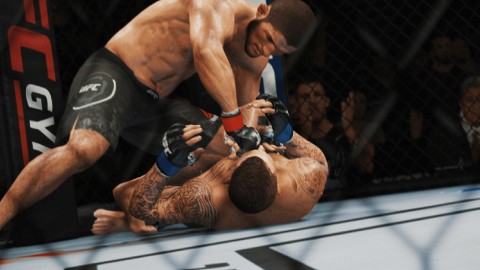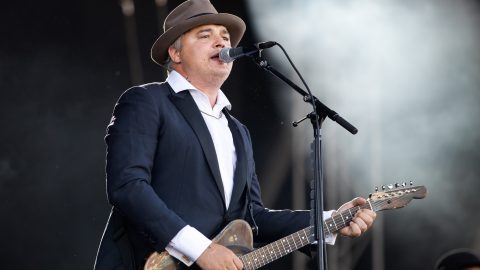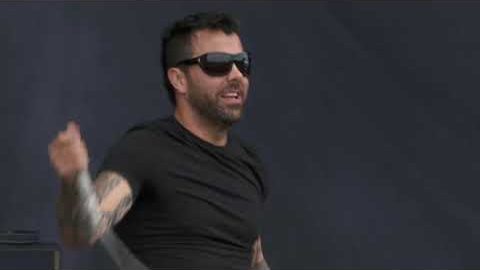
Lights! Camera! Rock action! For the past 70 years cinema has also been out to document, reflect, inspire and embolden youth culture, like NME if it charged you seven quid for a bucket of watered-down Pepsi. In honour of our big screen brother-with-armrests, then, here are the most important pop culture movies of our watch.
‘Jailhouse Rock’ (1957)
One year after Rock Around The Clock brought a fictionalised story of the birth of rock ’n’ roll to the big screen, Elvis’s first full-on jiving-in-the-aisles rock movie scandalised the world – a perp anti-hero! A mild cuss word! Hypnotic hips! – and kicked off the age of the teenage rebel in earnest.
‘A Hard Day’s Night’ (1964)
Rare is the moment that a seismic cultural phenomenon is captured by cinema as it’s happening. A Hard Day’s Night, despite some obvious staging, was Beatlemania blown up to the size of a bus, and the ultimate, impossible to ignore statement that rock ’n’ roll was taking over.
‘Woodstock’ (1970)
When the Woodstock festival took place in 1969, you just had to be there, man. But when the film of the event broadcast all of the free love chaos, naked mud hippies and brown-acid rock mayhem to the world, the legend of the ‘60s counterculture as a hedonistic free-for-all of peace, permissiveness and musical communion was set in stone.
‘Quadrophenia’ (1979)
If 1966’s Blowup was the Palm D’Or winning totem of the ‘60s mod scene, Quadrophenia – based on The Who’s 1963 rock opera – was its most visceral portrayal. With Phil Daniels joining Sting’s mod army en route to Brighton to ruck and rut on the streets, Quadrophenia didn’t just capture the spirit of the mod subculture of 1964 but of punk in the late-‘70s too.
‘This Is Spinal Tap’ (1984)
Sometimes satire succeeds where savagery fails. Punk, for all its pot shots at the established rock order, ultimately didn’t make much of a dent in the fortunes of the dinosaurs, but the outright mockery of their egos, ambitions and mentalities (“What’s wrong with being sexy?”) dished out in This Is Spinal Tap put paid to anyone wanting to emulate Led Zeppelin for a decade or so. In its wake, the hair rockers were forced to play up to their inherent camp, serious rock to drop the fantasy cosplay and sexism and the field lay open for grunge to shamble in and steal the day.
‘The Lost Boys’ (1987)
A slice of enjoyable proto-Twilight vampire hokum sure, but thanks to a soundtrack rich in crepuscular ‘80s pop (Echo & The Bunnymen, INXS, Gerard McMann’s haunting ‘Cry Little Sister’) The Lost Boys also helped popularise the biker goth-chic aesthetic in mainstream America and turned many a Tiffany fan to the dark side.
‘Pulp Fiction’ (1994)
One twist contest at Jack Rabbit Slim’s and American culture was ready to wipe clean the contemporary slate and fall in love with its various golden ages of rock ’n’ roll, soul and funk once again. Besides crystalising a cult of hip, retro chic cultural aesthetes, Pulp Fiction rejuvenated surf and garage rock and is ultimately the reason Lana Del Rey broke.
‘Trainspotting’ (1996)
With a soundtrack featuring Pulp, Underworld, Blur, Lou Reed, Iggy Pop and Primal Scream, several of whom could easily have inspired the film’s characters and plot, Danny Boyle’s adaptation of the Irvine Welsh novel spoke as much to dark undercurrent and bleak comedown of Britpop’s hedonistic blow-out as it did to the realities of hard drugs and hard knocks in Edinburgh’s smack squats. The quintessential ‘90s film.
‘Human Traffic’ (1999)
Rave culture is inherently difficult to reflect convincingly on film, not least because so much of it involves drunk blokes babbling into bored women’s ears in deafening clubs. But Justin Kerrigan’s Human Traffic did it best by dissecting the mindset and motivations of the “chemical generation” over the course of one wild weekend. Key to the film was that it refused to judge, condemn or sticky-end its drug-abusing protagonists, making it by far the most realistic and relatable portrayal of the ecstasy boom.
‘Almost Famous’ (2000)
Sixteen years on from This Is Spinal Tap, the less corny side of the ‘70s rock experience was ready for rehabilitation. Almost Famous acted as a sepia-stained window onto a golden age of embroidered denim and multi-platinum excess, and helped engender a broad-minded millennial respect for all angles of rock history. Cue Jet.
’24 Hour Party People’ (2002)
Amid the excitement of the early-‘00s alt-rock explosion, it felt fitting to hark back to Manchester’s late-‘80s equivalent as Michael Winterbottom’s acclaimed biopic of Factory Records boss Tony Wilson delivered an artful overview of the evolution of indie dance from Joy Division and New Order to the Mondays. Few scenes deserve – or were focused enough to merit – such a coherent movie, and Winterbottom twisted every ounce of drama and comedy out of Madchester’s melon.
‘Glastonbury’ (2007)
Julien Temple’s Glastonbury documentary is far more considered than the British version of Woodstock that many might have hoped for – an approach attempted with no little success by 1996’s Glastonbury: The Movie, which followed the 1993 festival day-by-day. But by tracing the full history of the world’s greatest festival he reveals that Glastonbury isn’t, like Woodstock, just about the politics and experience of one brain-frying weekend; it’s a decades old community and pan-generational mindset. A 200,000 strong ideological family, gathering annually to get twatted on psychedelic cider and fall in a long drop.
‘Amy’ (2015)
Not just the heart-breaking tale of a major talent lost to rock ’n’ roll mythology, Amy also marked the point, mid-2010s, of a generational shift in youth attitude away from live-fast-die-young, towards #BeMoreKind.
‘Get Out’ (2017)
With the BLM movement gathering pace in the wake of the deaths of Trayvon Martin, Michael Brown and Eric Garner, Jordan Peele’s hard-hitting horror-cum-social satire Get Out galvanised the conversation around the rise of white supremacy and the exploitation and social subjugation of African Americans. Nail-biter, to boot.
‘Summer Of Soul’ (2021)
The soul Woodstock – aka the 1969 Harlem Cultural Festival, featuring Stevie Wonder, BB King, The Staple Singers, Nina Simone and Sly & The Family Stone amongst others – finally got its dues in last year’s Sundance sensation: “the best music documentary I’ve ever seen,” according to Mark Kermode, and he’s seen a few.
The post 15 must-watch films from NME’s lifetime appeared first on NME.









